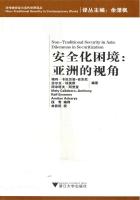It was soon after sunrise that the rebel-convict who paced the quarter-deck in Spanish corselet and headpiece, a Spanish musket on his shoulder, announced the approach of a boat. It was Don Diego de Espinosa y Valdez=20coming aboard with four great treasure-chests, containing each twenty-five thousand pieces of eight, the ransom delivered to him at dawn by Governor Steed. He was accompanied by his son, Don Esteban, and by six men who took the oars.
Aboard the frigate all was quiet and orderly as it should be. She rode at anchor, her larboard to the shore, and the main ladder on her starboard side. Round to this came the boat with Don Diego and his treasure. Mr. Blood had disposed effectively. It was not for nothing that he had served under de Ruyter. The swings were waiting, and the windlass manned. Below, a gun-crew held itself in readiness under the command of Ogle, who - as I have said - had been a gunner in the Royal Navy before he went in for politics and followed the fortunes of the Duke of Monmouth. He was a sturdy, resolute fellow who inspired confidence by the very confidence he displayed in himself.
Don Diego mounted the ladder and stepped upon the deck, alone, and entirely unsuspicious. What should the poor man suspect?
Before he could even look round, and survey this guard drawn up to receive him, a tap over the head with a capstan bar efficiently handled by Hagthorpe put him to sleep without the least fuss.
He was carried away to his cabin, whilst the treasure-chests, handled by the men he had left in the boat, were being hauled to the deck.
That being satisfactorily accomplished, Don Esteban and the fellows who had manned the boat came up the ladder, one by one, to be handled with the same quiet efficiency. Peter Blood had a genius for these things, and almost, I suspect, an eye for the dramatic. Dramatic, certainly, was the spectacle now offered to the survivors of the raid.
With Colonel Bishop at their head, and gout-ridden Governor Steed sitting on the ruins of a wall beside him, they glumly watched the departure of the eight boats containing the weary Spanish ruffians who had glutted themselves with rapine, murder, and violences unspeakable.
They looked on, between relief at this departure of their remorseless enemies, and despair at the wild ravages which, temporarily at least, had wrecked the prosperity and happiness of that little colony.
The boats pulled away from the shore, with their loads of laughing, jeering Spaniards, who were still flinging taunts across the water at their surviving victims. They had come midway between the wharf and the ship, when suddenly the air was shaken by the boom of a gun.
A round shot struck the water within a fathom of the foremost boat, sending a shower of spray over its occupants. They paused at their oars, astounded into silence for a moment. Then speech burst from them like an explosion. Angrily voluble they anathematized this dangerous carelessness on the part of their gunner, who should know better than to fire a salute from a cannon loaded with shot. They were still cursing him when a second shot, better aimed than the first, came to crumple one of the boats into splinters, flinging its crew, dead and living, into the water.
But if it silenced these, it gave tongue, still more angry, vehement, and bewildered to the crews of the other seven boats. From each the suspended oars stood out poised over the water, whilst on their feet in the excitement the Spaniards screamed oaths at the ship, begging Heaven and Hell to inform them what madman had been let loose among her guns.
Plump into their middle came a third shot, smashing a second boat with fearful execution. Followed again a moment of awful silence, then among those Spanish pirates all was gibbering and jabbering and splashing of oars, as they attempted to pull in every direction at once. Some were for going ashore, others for heading straight to the vessel and there discovering what might be amiss. That something was very gravely amiss there could be no further doubt, particularly as whilst they discussed and fumed and cursed two more shots came over the water to account for yet a third of their boats.
The resolute Ogle was making excellent practice, and fully justifying his claims to know something of gunnery.
In their consternation the Spaniards had simplified his task by huddling their boats together.
After the fourth shot, opinion was no longer divided amongst them. As with one accord they went about, or attempted to do so, for before they had accomplished it two more of their boats 'had been sunk.
The three boats that remained, without concerning themselves with their more unfortunate fellows, who were struggling in the water, headed back for the wharf at speed.
If the Spaniards understood nothing of all this, the forlorn islanders ashore understood still less, until to help their wits they saw the flag of Spain come down from the mainmast of the Cinco Llagas, and the flag of England soar to its empty place. Even then some bewilderment persisted, and it was with fearful eyes that they observed the return of their enemies, who might vent upon them the ferocity aroused by these extraordinary events.
Ogle, however, continued to give proof that his knowledge of gunnery was not of yesterday. After the fleeing Spaniards went his shots.
The last of their boats flew into splinters as it touched the wharf, and its remains were buried under a shower of loosened masonry.















